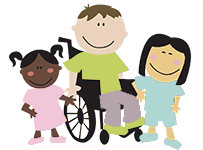 Pediatric speech therapists and occupational therapists are masters at identifying great toys and games. When recently asked about the top ten toys to encourage learning that could be used at home, I went to my therapists, who are the experts on fun and learning! I quickly found we couldn’t be limited to ten!
Pediatric speech therapists and occupational therapists are masters at identifying great toys and games. When recently asked about the top ten toys to encourage learning that could be used at home, I went to my therapists, who are the experts on fun and learning! I quickly found we couldn’t be limited to ten!
Keep in mind we all learn better and recall new information more effectively when we are motivated. When it comes to speech and language development, fine motor development or sensory development, we can motivate by rewarding a goal or learn intrinsically as a by product of a fun activity. With children it is great when you can accomplish both of these goals at once! A key contributor to learning is repetition, so activities that have built in repetition are great! Learn through play!
This list in not exhaustive by any means, but here are some of our favorites:
For toddlers
- Bubbles
- Play do
- beanbags and balls
- wind up toys that hop and flip
- musical or action cause and effect toys, such as Jack in the Box or Sesame Street push button pop up, or Poke – Dot Old MacDonald’s Farm.
- Books! Always important for developing vocabulary, sound recognition, emotions, and social routines.
- cars, trucks and trains with ramps or tracks
- balloons
- kitchen center with toy dishes and food
- water and sand play
- animals and farms
- puzzles
All of these activities build in opportunities for requesting, joint attention, and turn taking – as well as the opportunity to practice early developing sounds. Some of these activities can also be used for encouraging imaginative play.
Children Kindergarten through Elementary School Age
- Marble maze
- magnetic fishing game
- Cariboo
- S’Match
- Finders Keepers
- Who is Who
- Guess Who
- Chutes and Ladders
- Candy Land
- Cootie
- Mr. Potato Head
- Can You See What I See
- Outburst
- Connect Four
- Trouble
- Books! Again!
For all ages, teaching concepts along side of – or through music is very helpful. There is a lot of great music built around language and social skills concepts and music helps with memory! Music encourages motion as well, so it is an all around great resource. Families want to be sure that they don’t use music as a substitute for real interactions, but as one factor of learning through play.
Games are great because you can work on so many important skills, like waiting, turn taking, and how to be a good winner or loser. You can practice a skill before taking a turn, such as phrase production, sound production or use of the correct pronoun – to name a few. Again, books are important for vocabulary development and become increasingly more important for teaching social concepts as well as story structure. With older children you can teach concepts such as characters, topic and story events. You can find the problems and solutions in a story and also identify emotions. Books are a great way to jump into conversations about how things could have been different or for creating your own stories.
Notice that I haven’t added electronics to my list of favorite toys and games. This is not because tablets and computers aren’t an important tool for fun and learning. However, we want to encourage interactions with real, unpredictable people. We want children to develop the ability to communicate effectively in all kinds of real life situations and this requires engaging with others. Though electronics are an important part of our world and provide great opportunities and fun activities, we want to structure how a child uses these resources and for how long, so they can also develop other important skills that are a part of life.
Pediatric speech language pathologists and occupational therapists use all the fun activities mentioned on a regular basis as well as many more activities that can be found in local stores. Additionally, these childhood specialists use many toys and activities purchased through professional sources which are developed to meet specific needs. Many puzzles and games have been designed to teach specific concepts. For example, “WH” Bingo is a great game that targets, who, what, where, when and why. Granny’s Candies is another fun game that targets semantic concepts such as categorization, verbs, and vocabulary. Climbing walls are lots of fun while designed to address motor skill development. Therapeutic swings assist with vestibular development.
So try some of our favorite toys and games and share some of your own! For more information about how we help children, contact Speech & Occupational Therapy of North Texas, with locations in East Plano and Frisco.

Comments (0)